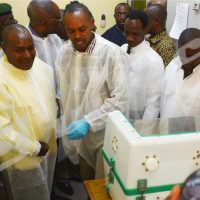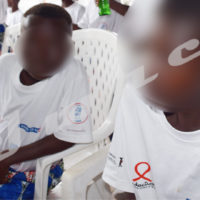About 8,000 people had contracted tuberculosis in Burundi in 2016. More than 4,000 suffered from contagious tuberculosis, said the Minister of Health marking World Tuberculosis Day on 24 March. Hungry sufferers say that their tuberculosis cannot be cured as long as they have nothing to eat.

Minister of Health distributes food to the vulnerable on the occasion of World Tuberculosis Day
More than 10 million had contracted tuberculosis and more than 2 million had died from tuberculosis in the world by 2015, according to WHO report. More than 75% of the people who contracted tuberculosis are Africans, said the Burundi Minister of Health, Josiane Nijimbere, and 16 out of 30 countries most affected in the world are African.
She said that, about 8,000 people had contracted tuberculosis in Burundi in 2016. Over 4,000 suffered from contagious tuberculosis. “94% of these patients have been treated and are well cured,” she said.
Walter Kazadi Mulombo, the WHO representative in Burundi, says that tuberculosis is one of the ten most deadly diseases in the world. For the year 2015, the WHO has recorded 8 million cases of tuberculosis and 1/3 of the cases were also affected by HIV / AIDS. “Tuberculosis-HIV/AIDS co-infection is a current problem which we must fight”, he says.
Malnutrition increase contract tuberculosis
Despite the efforts of the international community to detect and treat tuberculosis, it remains a threat to human health. “The categories of people most affected by this disease are children, women, people living with HIV/AIDS, people with diabetes, refugees, mining explorers, prisoners and drug users,” says Minister Nijimbere.
It is difficult to take tuberculosis treatment when you have nothing to eat, patients say. “We have already contracted tuberculosis because of the poor conditions we are living, we do not hope to be cured as long as we starve,” says a patient with tuberculosis at Kanyosha Health Center in southern Bujumbura. She asked not to be named. According to doctors, he says, tuberculosis patients will soon receive food assistance.
The Red Cross promised to provide food, but only to HIV/AIDS patients infected with tuberculosis, says Dr. Jean Berchimas Ntihebiwayo of the Kabezi Therapeutic Center. “There is no way to feed all people infected with tuberculosis. The Red Cross promised to assist HIV/AIDS patients co-infected with TB only.”
Minister Nijimbere notes that tuberculosis patients are being treated free of charge in Burundi. To combat the disease, the Minister says that the government is going to pay a lot of attention to the most vulnerable people, including the elderly, children, women, people living with HIV/AIDS and people at risk of malnutrition. She also says that the Ministry will organize campaigns to raise awareness of smoking cessation.
According to a 2016 report conducted by the United Nations agency OCHA, three million people, including 1.2 million children, have been affected by the crisis and economic collapse and require humanitarian assistance in Burundi. An estimated 62,500 children under five require treatment for severe acute malnutrition.



















 IWACU Open Data
IWACU Open Data

